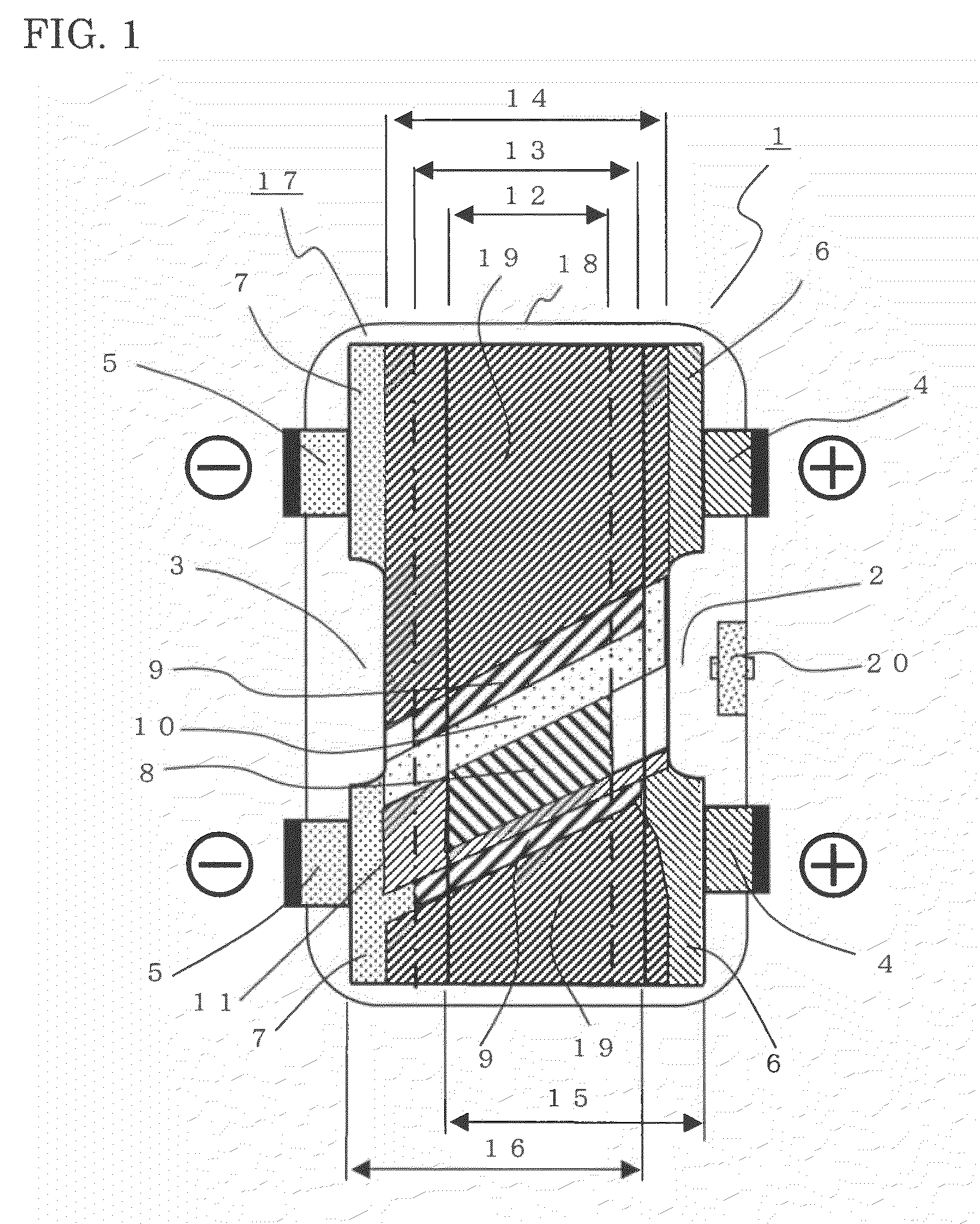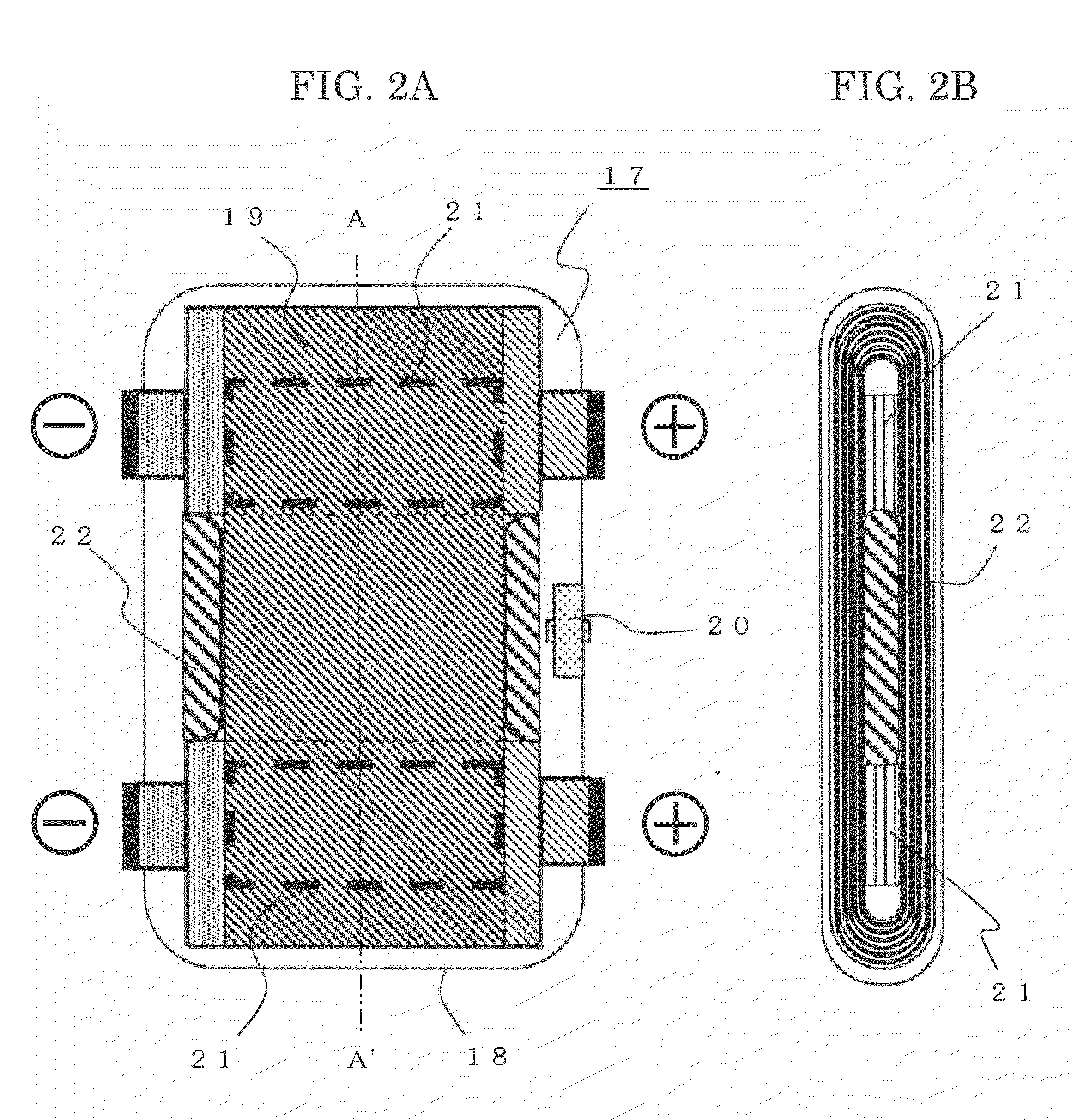Electrical energy storage cell and electrical energy storage module including the same
a technology of electrical energy storage and energy storage cells, applied in the direction of cell components, sustainable manufacturing/processing, wound/folded electrode electrodes, etc., can solve the problems of reducing the efficiency of charging and discharging, sharp reduction in performance, and power loss generation, so as to improve the heat dissipation characteristic of cells, reduce current collector resistance, and efficiently dissipate internally generated heat
- Summary
- Abstract
- Description
- Claims
- Application Information
AI Technical Summary
Benefits of technology
Problems solved by technology
Method used
Image
Examples
embodiment 1
[0029]FIG. 1 is a partially cutaway schematic plan view of an electrical energy storage cell according to Embodiment 1 for implementing the present invention. The electrical energy storage cell according to Embodiment 1 will be described in the case of an electric double-layer capacitor. The invention is not limited to this one, but can apply in the same way to a lithium-ion battery cell, a lithium-ion capacitor, or the like.
[0030]An electrical energy storage cell 1 in the present embodiment comprises two cathode (positive electrode) terminals 4 and two anode (negative electrode) terminals 5, whereby heat build-up in the cell is reduced and current collection thereof is enhanced. A cathode (positive electrode) current collector foil cutaway portion (also called cathode foil cutaway portion, or cutaway portion, or recessed portion), designated at 2, and an anode (negative electrode) current collector foil cutaway portion (also called anode foil cutaway portion, or cutaway portion, or...
embodiment 2
[0066]Next, an electrical energy storage module using the electrical energy storage cell according to the present invention will be described referring to FIGS. 8 and 9. FIG. 8A and FIG. 8B show a schematic internal plan view and a cross-sectional view, respectively, illustrating a three-cell storage module using the electrical energy storage cell of a flat roll configuration, according to Embodiment 2. The electrical energy storage cell referred to in the present embodiment is one that has been described in Embodiment 1. Three electrical energy storage cells 1 are arranged inside a casing for containing the module (hereinafter called a module casing), designated by reference numeral 40, of aluminum formed by a drawing process. In one of the electrical energy storage cells 1 and its adjacent cell, two of the cathode terminals 4 of the former and two of the anode terminals 5 of the latter are connected together using heat dissipation plates 41 made of a copper plate. In the same stor...
embodiment 3
[0071]FIG. 10 is a plan view illustrating the flat roll electrical energy storage cell according to Embodiment 3 of the present invention. A difference between the present embodiment and Embodiment 1 is that the electrolyte reservoir 22 of the current collector foil cutaway portion is not made to pass through the core portion, with the configuration remaining the same except for this difference. In the present embodiment, although the electrolyte reservoir 22 of the current collector foil cutaway portion is not inserted into the core portion, the separator, which is exposed from the current collector foil at the cathode foil cutaway portion 2 and anode foil cutaway portion 3, make a contact with the electrolyte reservoir 22 of the current collector foil cutaway portion, thus enabling sufficient transfer of the electrolyte.
[0072]Further, because the core electrolyte reservoir 21 is disposed, and the electrolyte released from the separator to the electrolyte reservoir 22 is absorbed b...
PUM
| Property | Measurement | Unit |
|---|---|---|
| voltage | aaaaa | aaaaa |
| voltage | aaaaa | aaaaa |
| voltage | aaaaa | aaaaa |
Abstract
Description
Claims
Application Information
 Login to View More
Login to View More - R&D
- Intellectual Property
- Life Sciences
- Materials
- Tech Scout
- Unparalleled Data Quality
- Higher Quality Content
- 60% Fewer Hallucinations
Browse by: Latest US Patents, China's latest patents, Technical Efficacy Thesaurus, Application Domain, Technology Topic, Popular Technical Reports.
© 2025 PatSnap. All rights reserved.Legal|Privacy policy|Modern Slavery Act Transparency Statement|Sitemap|About US| Contact US: help@patsnap.com



